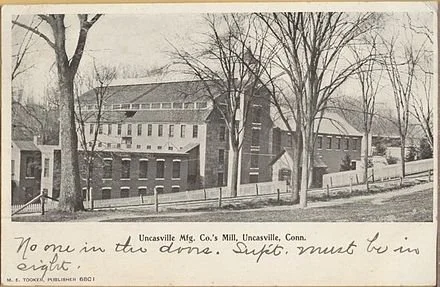
‘Reality and imagination’
From Wendy Clough’s show “Landscape in Transformation,’’ at the Davidow Fine Art Gallery at Colby Sawyer College, New London, Conn., Sept. 26-Dec. 3.
She says:
“The theme of my work is animated nature and my experience of the natural world. Having spent the majority of my life in New Hampshire and Colorado, I have been and am surrounded by natural beauty. I use my painting and my fiber art to explore ideas such as memory, nostalgia, the value of nature, and the link between reality and imagination.’’
Lake Sunapee, a famed summer attraction in the New London area.
Buck up before signing up
Statue of Nobel Prize-winning playwright Eugene O'Neil (1888-1953) as a boy, overlooking the harbor of New London, Conn., where his family had a summer place and where some of his plays were based. As a young adult, he spent several years working in the merchant marine.
“The sea hates a coward.’’
—From the O’Neill play Mourning Becomes Electra
Michelle Andrews: In N.H., a painful and confusing colonoscopy medical bill
Lake Sunapee, part of which is in the town of Sunapee, where Elizabeth Melville lives.
‘Elizabeth Melville and her husband are gradually hiking all 48 mountain peaks that top 4,000 feet in New Hampshire.
“I want to do everything I can to stay healthy so that I can be skiing and hiking into my 80s — hopefully even 90s!” said the 59-year-old part-time ski instructor who lives in the vacation town of Sunapee.
So when her primary-care doctor suggested she be screened for colorectal cancer in September, Melville dutifully prepped for her colonoscopy and went to New London Hospital’s outpatient department for the zero-cost procedure.
Typically, screening colonoscopies are scheduled every 10 years starting at age 45. But more frequent screenings are often recommended for people with a history of polyps, since polyps can be a precursor to malignancy. Melville had had a benign polyp removed during a colonoscopy nearly six years earlier.
Melville’s second test was similar to her first one: normal, except for one small polyp that the gastroenterologist snipped out while she was sedated. It too was benign. So she thought she was done with many patients’ least favorite medical obligation for several years.
Then the bill came.
The Patient: Elizabeth Melville, 59, who is covered under a Cigna health plan that her husband gets through his employer. It has a $2,500 individual deductible and 30% coinsurance.
Medical Service: A screening colonoscopy, including removal of a benign polyp.
Service Provider: New London Hospital, a 25-bed facility in New London, N.H. It is part of the Dartmouth Health system, a nonprofit academic medical center and regional network of five hospitals and more than 24 clinics with nearly $3 billion in annual revenue.
Total Bill: $10,329 for the procedure, anesthesiologist and gastroenterologist. Cigna’s negotiated rate was $4,144, and Melville’s share under her insurance was $2,185.
What Gives: The Affordable Care Act made preventive health care such as mammograms and colonoscopies free of charge to patients without cost sharing. But there is wiggle room about when a procedure was done for screening purposes, versus for a diagnosis. And often the doctors and hospitals are the ones who decide when those categories shift and a patient can be charged — but those decisions often are debatable.
Getting screened regularly for colorectal cancer is one of the most effective tools that people have for preventing it. Screening colonoscopies reduce the relative risk of getting colorectal cancer by 52% and the risk of dying from it by 62%, according to a recent analysis of published studies.
The U.S. Preventive Services Task Force, a nonpartisan group of medical experts, recommends regular colorectal cancer screening for average-risk people from ages 45 to 75.
Colonoscopies can be classified as for screening or for diagnosis. How they are classified makes all the difference for patients’ out-of-pocket costs. The former generally incurs no cost to patients under the ACA; the latter can generate bills.
The Centers for Medicare & Medicaid Services has clarified repeatedly over the years that under the preventive services provisions of the ACA, removal of a polyp during a screening colonoscopy is considered an integral part of the procedure and should not change patients’ cost-sharing obligations.
After all, that’s the whole point of screening — to figure out whether polyps contain cancer, they must be removed and examined by a pathologist.
Many people may face this situation. More than 40% of people over 50 have precancerous polyps in the colon, according to the American Society for Gastrointestinal Endoscopy.
Someone whose cancer risk is above average may face higher bills and not be protected by the law, said Anna Howard, a policy principal at the American Cancer Society’s Cancer Action Network.
Having a family history of colon cancer or a personal history of polyps raises someone’s risk profile, and insurers and providers could impose charges based on that. “Right from the start, [the colonoscopy] could be considered diagnostic,” Howard said.
In addition, getting a screening colonoscopy sooner than the recommended 10-year interval, as Melville did, could open someone up to cost-sharing charges, Howard said.
Coincidentally, Melville’s 61-year-old husband had a screening colonoscopy at the same facility with the same doctor a week after she had her procedure. Despite his family history of colon cancer and a previous colonoscopy just five years earlier because of his elevated risk, her husband wasn’t charged anything for the test. The key difference between the two experiences: Melville’s husband didn’t have a polyp removed.
Resolution: When Melville received notices about owing $2,185, she initially thought that it must be a mistake. She hadn’t owed anything after her first colonoscopy. But when she called, a Cigna representative told her the hospital had changed the billing code for her procedure from screening to diagnostic. A call to the Dartmouth Health billing department confirmed that explanation: She was told she was billed because she’d had a polyp removed — making the procedure no longer preventive.
During a subsequent three-way call that Melville had with representatives from both the health system and Cigna, the Dartmouth Health staffer reiterated that position, Melville said. “[She] was very firm with the decision that once a polyp is found, the whole procedure changes from screening to diagnostic,” she said.
Dartmouth Health declined to discuss Melville’s case with KHN even though she gave her permission for it to do so.
After KHN’s inquiry, Melville was contacted by Joshua Compton, of Conifer Health Solutions, on behalf of Dartmouth Health. Compton said the diagnosis codes had inadvertently been dropped from the system and that Melville’s claim was being reprocessed, Melville said.
Cigna also researched the claim after being contacted by KHN. Justine Sessions, a Cigna spokesperson, provided this statement: “This issue was swiftly resolved as soon as we learned that the provider submitted the claim incorrectly. We have reprocessed the claim and Ms. Melville will not be responsible for any out of pocket costs.”
The Takeaway: Melville didn’t expect to be billed for this procedure. It seemed exactly like her first colonoscopy, nearly six years earlier, when she had not been charged for a polyp removal.
But before getting an elective procedure like a cancer screening, it’s always a good idea to try to suss out any coverage minefields, Howard said. Remind your provider that the government’s interpretation of the ACA requires that colonoscopies be regarded as a screening even if a polyp is removed.
“Contact the insurer prior to the colonoscopy and say, ‘Hey, I just want to understand what the coverage limitations are and what my out-of-pocket costs might be,’” Howard said. Billing from an anesthesiologist — who merely delivers a dose of sedative — can also become an issue in screening colonoscopies. Ask whether the anesthesiologist is in-network.
Be aware that doctors and hospitals are required to give good faith estimates of patients’ expected costs before planned procedures under the No Surprises Act, which took effect this year.
Take the time to read through any paperwork you must sign, and have your antennae up for problems. And, importantly, ask to see documents ahead of time.
Melville said that a health system billing representative told her that among the papers she signed at the hospital on the day of her procedure was one saying that if a polyp was discovered, the procedure would become diagnostic.
Melville no longer has the paperwork, but if Dartmouth Health did have her sign such a document, it would likely be in violation of the Affordable Care Act. However, “there’s very little, if any, direct federal oversight or enforcement” of the law’s preventive services requirements, said Karen Pollitz, a senior fellow at KFF.
In a statement describing New London Hospital’s general practices, spokesperson Timothy Lund said: “Our physicians discuss the possibility of the procedure progressing from a screening colonoscopy to a diagnostic colonoscopy as part of the informed consent process. Patients sign the consent document after listening to these details, understanding the risks, and having all of their questions answered by the physician providing the care.”
To patients like Melville, that doesn’t seem quite fair, though. She said, “I still feel asking anyone who has just prepped for a colonoscopy to process those choices, ask questions, and potentially say ‘no thank you’ to the whole thing is not reasonable.”
Michelle Andrews is a Kaiser Health News reporter. @mandrews110
‘Panting like spaniels’
“Climbing the stairway gray with urban midnight,
Cheerful, venial, ruminating pleasure,
Darkness takes me, an arm around my throat and
Give me your wallet.
Fearing cowardice more than other terrors,
Angry I wrestle with my unseen partner,
Caught in a ritual not of our own making
panting like spaniels….”
— From “Effort at Speech,’’ by William Meredith (1919-2007), U.S. poet laureate in 1978-1980. He taught at Connecticut College, in New London, and had a farm on the Thames River in nearby Uncasville, an old mill village in the town of Montville. He became a very able arborist.
The admissions building at Connecticut College, founded in 1911 as "Connecticut College for Women" in response to Wesleyan University, in nearby Middletown, closing its doors to women in 1909; it shortened its name to "Connecticut College" in 1969, when it began admitting men.
Uncasvillle Mill in 1906, in its industrial heyday
Eversource touts New London as offshore-wind staging site
Rendering of State Pier project in New London
From reporting by The New England Council (newenglandcouncil.com)
“Eversource Energy has made progress in its siting process for wind-power turbines in the Atlantic. According to Eversource CEO Joseph R. Nolan Jr., State Pier in New London, Conn., is a ‘superior location’ to assemble these turbines, with the company preparing to spend billions of dollars in the coming years developing wind power in the region. Expansion of State Pier to make the location suitable to wind-turbine assembly is in the works.
Eversource spokeswoman Caroline Pretyman says that State Pier’s proximity to offshore leases presents a ‘strategic opportunity’ for the industry to site facilities for wind-turbine parts assembly. This project is associated with Eversource’s development of Revolution Wind, a 704-megawatt offshore wind farm that will supply 400 megawatts of power to Rhode Island and 304 megawatts to Connecticut. Nolan said supply-chain problems over the past few months have driven up costs higher than expected but he remains confident in Eversource’s upcoming projects and optimistic about their environmental impacts.
Trying to save what we inherited
The "grass ramp" from the entrance to the lily pond at the Connecticut College Arboretum
“What I have done in life has not been motivated by an effort to save myself from unpleasant experiences in the next, but rather, at least in part, by a desire to preserve the beauty and biological integrity of the earth we have inherited.’’
— Richard H. Goodwin (1910-2007), botanist and conservationist, co-founder and twice president of The Nature Conservancy and long-time professor and director of the arboretum at Connecticut College, in New London
—
Chris Powell: Landslides can bring out the worst in pols; casino fallacy
MANCHESTER, Conn.
Should every Republican on the party's ticket with President Trump this year be defeated if he won't denounce or at least criticize the president for his demeanor, policies, or both?
That's the suggestion of New London Day columnist David Collins, who complained the other day that he could not find one Republican candidate in eastern Connecticut willing to discuss the president. Noting the president's unpopularity in the state, Collins wrote: "Surely I can't be the only one who wouldn't consider voting for anyone who won't even comment about the head of their party and his agenda for the country."
Of course, Collins isn't the only one who feels as he does, but there are a few problems with his position.
First is that turnabout is fair play, and Collins lately has expressed outrage about Gov. Ned Lamont's disregard for the New London area. Since the governor is a Democrat, won't re-electing Democrats to the General Assembly vindicate the governor's disregard? Will electing Republican legislators produce any better results for the area? Republicans don't seem to have given much reason to think so.
The second problem, a bigger one, is the difficulty of punishing Trump's ticket mates for his offenses without also punishing the whole state. Yes, in general Republican state legislators are uninspired and timid, not much interested in gaining a majority, mainly content with escaping responsibility for governing, but at least they are much less enthusiastic tools of the government-employee unions and welfare class than Democratic legislators are.
So what is one to do if he detests Trump but also would prefer not to pay more in state taxes for Democratic policies and patronage that only impoverish the state? What if someone wants to avoid not just highway tolls but more raises and pension benefits for government employees while the private sector is crashing? Someone who feels that way and sets out to punish all Republicans for complicity with Trump ends up punishing himself as well.
The third problem is that political landslides such as Collins seems to be advocating can bring out the worst in elected officials, making them arrogant, corrupt, and stupid, as Connecticut might have learned after electing John G. Rowland to a third term as governor in 2002.
President Lyndon B. Johnson's big win at the top of the Democratic ticket in 1964 unleashed his escalation of the Vietnam War. But by 1967 even as the war was plainly a futile enterprise incompetently pursued, few Democratic officials dared to say a word against the president, just as few Republican officials dare to say a word against Trump today. Only when public opinion, without any help from most Democratic leaders, turned against Johnson in 1968 did the president withdraw from re-election -- and only after a Republican, Richard Nixon, was elected president did most Democratic leaders decide that the war was a disaster.
Similarly, Nixon's landslide re-election in 1972 only deepened his administration's criminal corruption. In less than two years both he and his vice president, Spiro Agnew, were exposed and compelled to resign.
Connecticut already suffers inefficiency and corruption in state government because of the state's lack of political competition. Shrinking the Republican minority in the General Assembly to spite the party for Trump won't provide any incentive for state government to improve. It will just give the majority party more license.
xxx
The MGM Springfield casino and hotel complex. Casinos redistribute money from the many to the rich few.
CASINO FALLACY: MGM's casino in Springfield is thumping its chest about all the jobs and tax revenue it has brought to western Massachusettts. But the jobs and revenue are not what was projected, and such claims are inherently misleading anyway.
For casinos produce nothing of value. People who spend their money at casinos no longer spend it on amusement somewhere else. Casinos merely redistribute money from the many -- the public, disproportionately the poor -- to the few, the casino operators, disproportionately the rich, and to the government. That is, casinos are mechanisms of regressive taxation.
A casino adds economically to an area only insofar as it attracts people from elsewhere, and so the only claim genuinely in favor of the Springfield casino is that it may have kept many Massachusetts gamblers spending their money at home instead of at the casinos in southeastern Connecticut.
Chris Powell is a columnist for the Journal Inquirer, in Manchester.
Urban, but less so
Hanover Theatre for the Performing Arts, in Worcster
Photo by Truthanado
From Robert Whitcomb’s “Digital Diary,’’ in GoLocal24.com
Some people are deciding, with the impetus of COVID-19 and, perhaps, recent public protests, to move out of big cities such as Boston. I suppose most of them will move to the sprawl and car culture of the suburbs. But I think that some others will move to smaller cities not far away from the big ones to try to keep some of the benefits of urban life, such as the proximity of services, cultural institutions and so on.
In southern New England that would include Providence, Worcester and New Haven, all of which, whatever their flaws, have many lovely neighborhoods, cultural assets, some dating back to their 19th Century economic apogees and some to the (incomplete) urban renaissances of the past couple of decades. Even troubled Hartford has many attractions. Then there’s the too often overlooked New London, with its colleges and dramatic location on Long Island Sound and the Thames River and ferry service to the East End of Long Island. And there are gorgeous old towns nearby.
I look forward to seeing what kind of inter-urban migration develops over the next year or two.
It might be considered a bit ghoulish at this point for smaller cities to try to recruit residents from the big metros but I’m sure it can be done politely.
'Ugly as they may seem'
Monte Cristo Cottage, in New London, Conn., used mostly as a summer place by playwright Eugene O’Neill’s family when he was growing up. The name of the house, the first part of which was built in 1840s, came from the fact that the most popular and lucrative role of Eugene O'Neill's father, the actor James O'Neill, was as Edmond Dantès in The Count of Monte Cristo.
— Photo by Ntiprog
— Photo by Staib
“If a person is to get to the meaning of life, he must learn to like the facts about himself — ugly as they may seem to his sentimental vanity — before he can lay hold on the truth behind the facts; and that truth is never ugly!”
Eugene O’Neil (1888-1953), Nobel Prize-winning playwright. He was born in New York City and is buried in Boston’s Forest Hills Cemetery.
Will these sculptures preside over the (Conn.) Thames?
New London from Fort Trumbull
From Robert Whitcomb’s “Digital Diary,’’ in GoLocal24.com
I love this sort of project!
Killingworth, Conn., sculptor Renee Rhodes wants to create two 30-foot-tall bronze statues of female figures, one on the Groton side and the other on the New London side of the Thames River. Some readers may have seen her very popular life-size bronze sculpture of Athena in downtown New London.
I hope that her Thames project happens. Such creations tend to cheer the traveling public and arouse local pride
Don Pesci : Long after 'The Little Pink House' outrage, a rectification bill
“The Little Pink House’’ in New London was moved to another location after a long, unsuccessful protest by its owner, property-rights advocate Susette Kelo. The property upon which it rested was seized by eminent domain so that it could be made available to Pfizer Inc. It was a rare seizure. Usually, property seized under eminent domain is made available for some public purpose. In the Kelo case, the Fort Trumbull Property was transferred from one private owner to another private owner to further economic development. The property was seized by the state because New London wished to induce Pfizer to set up shop on the property. Pfizer moved on; nature soon reclaimed the vacant property.
Kelo lost her battle when the U.S. Supreme Court shamelessly decided in favor of the City of New London, in Kelo v. City of New London, 545 U.S. 469 (2005).
The case produced two notable dissents, one written by Justice O'Connor, joined by Chief Justice Rehnquist and Justices Scalia and Thomas, and a separate, originalist dissent written by Thomas.
Noting that the taking represented a reverse Robin Hood intent – taking from poor householders and given to a wealthy company – O’Conner argued that the majority decision eliminates "any distinction between private and public use of property — and thereby effectively delete[s] the words 'for public use' from the Takings Clause of the Fifth Amendment… Any property may now be taken for the benefit of another private party, but the fallout from this decision will not be random. The beneficiaries are likely to be those citizens with disproportionate influence and power in the political process, including large corporations and development firms.”
Thomas argued that the court had relied upon false precedents, and he accused the majority of replacing the Fifth Amendment's "public use" clause with a very different "public purpose" test. “This deferential shift in phraseology,” Thomas noted, “enables the Court to hold, against all common sense, that a costly urban-renewal project whose stated purpose is a vague promise of new jobs and increased tax revenue, but which is also suspiciously agreeable to the Pfizer Corporation, is for a 'public use’… Something has gone seriously awry with this Court's interpretation of the Constitution. Though citizens are safe from the government in their homes, the homes themselves are not.”
Pfizer is gone, “The Little Pink House’’ has been moved, the stinging dissents have lost their sting, but there are two Connecticut legislators who are not in the habit of forgetting grievous wrongs: State Rep. Tami Zawistowski, who has produced a rectification bill that has been co-sponsored by Rep. Gail Lavielle. Both women are work-horse legislators rather than tinsel-top show-horse representatives pushing the latest enticing snake oil legislation.
“I find it problematic,” Zawistowski said, "that opponents would like to have available other people's property for economic development or transit-oriented development unfettered by protections of private property rights. If they're building a highway or rail line for public use - fine, but a shopping mall or apartments near a rail line where someone is going to make money? No. I get it if properties are blighted or abandoned - but there are other statutes that will allow that.”
On the question of property rights, the right and left in the Supreme Court converged, if only in dissent; in so doing, the dissenters were reaffirming the views of Thomas Jefferson on the preeminence of the right to own and dispose of property:
“The right to procure property and to use it for one's own enjoyment is essential to the freedom of every person, and our other rights would mean little without these rights of property ownership. It is also for these reasons that the government's power to tax property is placed in those representatives most frequently and directly responsible to the people, since it is the people themselves who must pay those taxes out of their holdings of property… Charged with the care of the general interest of the nation, and among these with the preservation of their lands from intrusion, I exercised, on their behalf, a right given by nature to all men, individual or associated, that of rescuing their own property wrongfully taken."
Zawistowski's bill would right a wrong, reaffirm a masterful dissent that brought together both Justices O’Connor and Thomas in a stirring defense of the right of property holders, and ring loudly Jefferson’s liberty bell in defense of a right “admitted by all” – even “before the establishment of government.”
Committee Bill No. 5123 affirms that “No real property may be acquired by a redevelopment agency by eminent domain pursuant to section 8-128 under a redevelopment plan under this chapter for the purpose of producing income from such real property to a private entity or for the primary purpose of increasing local tax revenue.”
Any bill that brings together in agreement Supreme Court justices of the right and left, that is affirmed by the founders of the Republic, and that protects the natural free rights of all the citizens of Connecticut against predatory corporations allied with unconstitutional political interests, must be affirmed by legislators of good will acting in a non-partisan manner for the greater good of the people of Connecticut.
This one should proudly pass through the Connecticut General Assembly with its banners unfurled.
Don Pesci is a Vernon, Conn.-based columnist.
i
Eversource and Orsted to partner in 2 offshore wind projects
From The New England Council (newenglandcouncil.com):
Eversource and Ørsted have announced a partnership in two offshore wind projects off the coast of Massachusetts and Rhode Island. This partnership marks Eversource’s entrance into offshore wind energy.
Eversource is purchasing a 50 percent stake in two projects being developed by Ørsted — the Revolution Wind and South Fork Wind Farm. In addition to the wind projects themselves, the wind-power industry and state governments have committed to investing in the State Pier in New London, Conn., which will be used as a transit point for turbines and parts. The Revolution Wind partnership will deliver enough energy to power 420,000 homes and businesses in Rhode Island and Connecticut. The South Fork Wind Farm will provide electricity for more than 70,000 homes on eastern Long Island.
Executive Vice President of Enterprise Energy Strategy at Eversource Lee Olivier, commenting on on wind energy, said “We think it’s the future in this region. . . We think when you look at the proximity where much of offshore wind will be developed, it’s a good opportunity to bring the future into New London. It’s a real advantage for developing wind in the Northeast.”
“We are excited to have Eversource join us as we embark on the creation of the strongest U.S. offshore wind platform,” added Thomas Brostrøm, CEO of Ørsted U.S. Offshore Wind and president of Ørsted North America.
The New England Council applauds this new partnership between Eversource and Ørsted, and the impact it will have on expanding access to renewable energy in New England.
Conn. also getting into offshore wind
New London is being eyed as a center for the offshore wind-power industry.
Via ecoRI News (ecri.org)
The Connecticut Department of Energy and Environmental Protection (DEEP) recently closed the bidding period of a request for proposals (RFP) for renewable-energy resources, including offshore wind. The RFP, which closed April 2, allowed bidders to propose up to the maximum amount of offshore wind generation allowed under law: 3 percent of load or about 250 megawatts.
“Offshore wind is a critical technology for states to meet their clean energy and greenhouse gas reduction requirements,” said Emily Lewis, a policy analyst at Acadia Center. “The region needs rapid deployment of offshore wind, and Connecticut’s RFP shows that the state wants to participate in growing the market for this clean energy resource.”
While DEEP hasn’t yet published the details of the submitted proposals, any selected offshore wind project will likely fulfill Connecticut’s legal limit for offshore wind. The Connecticut General Assembly will need to take action to continue growing offshore wind.
“With aggressive commitments from Massachusetts, New York and New Jersey, the emerging offshore wind industry will bring thousands of highly paid, skilled jobs to the Northeast in the coming years," said John Humphries, organizer for the Connecticut Roundtable on Climate and Jobs. "Connecticut has taken a modest initial step with this procurement process, but the good news is that New London's port is well positioned to become a regional hub of activity to support offshore wind projects up and down the coast.”
Recent studies have shown that offshore wind development could create as many as 36,000 jobs in the Northeast region, but significant long-term commitments from Connecticut and other states are needed to maximize this economic development potential throughout the offshore wind supply chain.
“We have the skilled people to make this happen. The building trades workforce of Eastern Connecticut is eager to do whatever is needed to support this growing industry,” said Keith Brothers, president of the New London-Norwich Building and Construction Trades Council.
Scott Bates, chairman of the Connecticut Port Authority, said, “Wind energy has the potential to help power Connecticut’s maritime economy. This is an industry that is custom designed to leverage our deepwater ports. Connecticut is uniquely positioned geographically and logistically to support development of offshore wind projects from southern New England to the Mid-Atlantic states.
“Besides our obvious strategic location at the exact center of the region most likely to support offshore wind, New London also happens to be the only port between Boston and Norfolk with no height restrictions (no bridges) in the main channel.”
Save the architectural glories of New London
The New London skyline from Fort Trumbull.
From Robert Whitcomb's "Digital Diary,'' in GoLocal24.com:
I’ve long been fond of New London, Conn., with its dramatic setting where the Thames River meets Long Island Sound, with its ferry service to Orient Point and Block Island, the submarine base across the river in Groton, the Coast Guard Academy, Connecticut College and other institutions. The city still has some glorious old – but badly maintained -- downtown buildings constructed in its ocean-shipping days, which included the whaling boom. But there’s not been the sort of architectural preservation that has saved much of downtown New Bedford, with a somewhat similar history as New London’s, from the wrecking ball.
To help protect and repair its gorgeous old downtown buildings, New London, as David Collins, of the local paper, The Day, has suggested, needs a downtown historic district as rigorous as New Bedford’s. It would then benefit more strongly from tourism and other synergies associated with its role as a ferry port through which many thousands of travelers, tourists and students go every year.
Chris Powell: Infrastructure projects not enough to offset slob culture
MANCHESTER, Conn. Geographically New London is spectacular, with Long Island Sound on one side and the Thames River on the other, and a beautiful old train station downtown with passenger service north to Boston and south to New Haven, New York, and beyond. The city practically shouts of potential.
Geographically Waterbury is spectacular too, built on hills along the Naugatuck River with sweeping views, an expansive downtown green, and its own beautiful old train station, which, while now occupied by the city's newspaper, the Republican-American, remains the terminus for passenger service to New York and beyond. Potential is also Waterbury's middle name.
Unfortunately the other day both cities were not realizing any potential but just having their noses rubbed in gritty reality.
In New London, as reported by the city's newspaper, The Day, nine downtown residents complained to a City Council meeting about disgusting misbehavior in their neighborhood -- public drunkenness and drug use, panhandling, vomiting, and worse by vagrants, whom political correctness has euphemized as "the homeless." The residents said they were not just offended but fearful.
"It's very intimidating and frightening walking alone," one told the council. "I love this city. I think this city has incredible potential. But with this situation, who wants to come here?"
Crime by predatory young men has been a chronic problem in downtown New London, the most infamous incident being the murder of a pizza shop worker 3½ years ago by a wolf pack of six who, upon their apprehension, said they had set out to assault someone because they were bored.
At the council meeting a deputy police chief sympathized with the complaints but offered only the weak hope of increased police patrols if the department ever recovers from a personnel shortage.
Meanwhile Waterbury was learning from the Republican-American that the state Department of Economic and Community Development had just ranked the city as the most distressed municipality in Connecticut, displacing Hartford, which had spent years at the top of the list and dropped to No. 2. New Britain and Bridgeport ranked third and fourth, the rankings calculated from personal income, employment, education levels and property values.
The newspaper quoted local officials as saying that a municipality ranked distressed has the advantage of some preference for state government financial grants. Yet that preference has not done much for Hartford, which, as the state capital for 140 years, long has had another advantage, hosting what are now thousands of well-paid state government jobs only to fall steadily from being perhaps the richest city in the country to being among the poorest 10.
Geography gives Hartford, New Britain, and Bridgeport great potential too, but as things have turned out, such natural advantages are not decisive for quality of life. Indeed, natural advantages seem to mean less over time, as does a municipality's physical infrastructure, on which state government lately has concentrated, with new government buildings erected in Waterbury and Hartford, the bus highway being built between Hartford and New Britain, the Coast Guard museum being planned in New London, and such.
No, the decisive element of a municipality's infrastructure and potential is only what it always has been: the people who live there. Capable, self-sufficient people can accomplish much, but a half century of public policy in Connecticut purporting to raise people out of poverty has only driven them into it deeper and made them more dependent on government, policy that has correlated only with urban decline and the explosion of a demoralizing slob culture.
Much more than colleges relocated downtown, renovated theaters, convention centers and stadiums, Connecticut needs someone in authority to ask: What exactly has happened here and when is any of this stuff supposed to work?
Chris Powell is managing editor of the Journal Inquirer, in Manchester, Conn.



























